Organisational Behaviour and Psychology Assignment
VerifiedAdded on 2021/02/22
|15
|4677
|45
AI Summary
This assignment requires the student to provide a list of references from various sources, including academic journals and online articles. The references are related to organisational behaviour and psychology, covering topics such as leadership, culture, and employee well-being. The student is also asked to include relevant information about Ryanair, a company that has been involved in controversies regarding its handling of issues. The assignment is likely part of a course on industrial psychology or organisational behaviour.
Contribute Materials
Your contribution can guide someone’s learning journey. Share your
documents today.
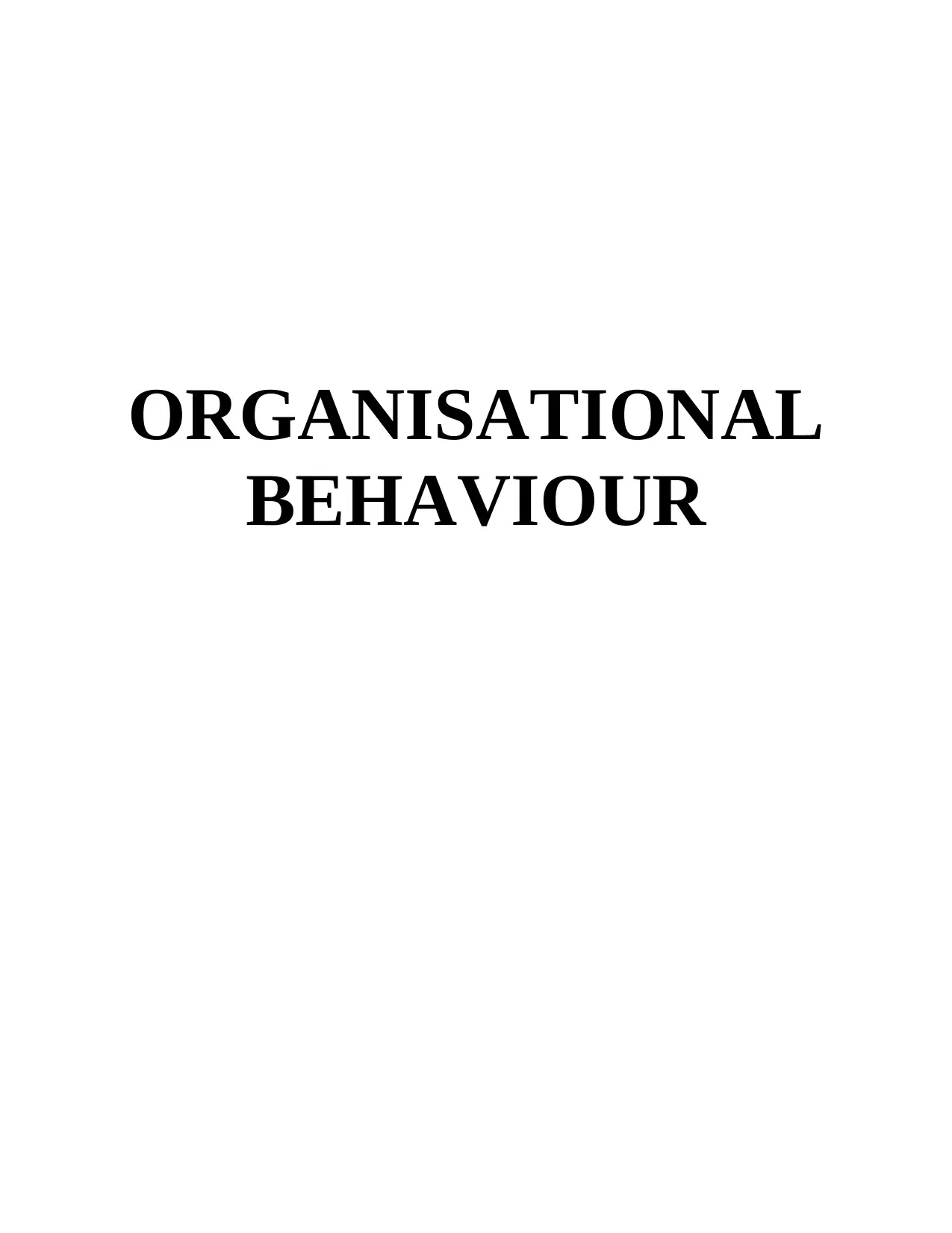
ORGANISATIONAL
BEHAVIOUR
BEHAVIOUR
Secure Best Marks with AI Grader
Need help grading? Try our AI Grader for instant feedback on your assignments.
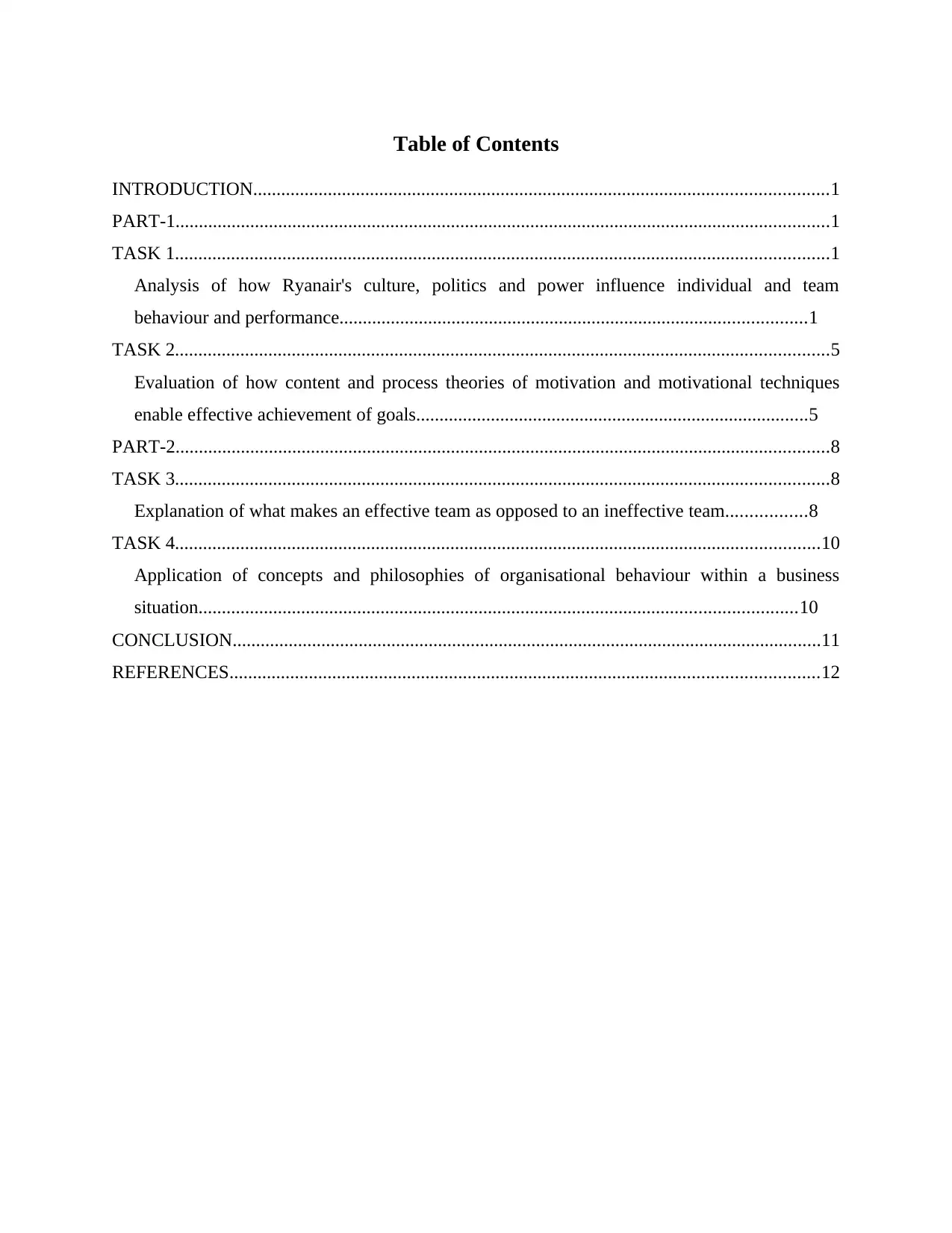
Table of Contents
INTRODUCTION...........................................................................................................................1
PART-1............................................................................................................................................1
TASK 1............................................................................................................................................1
Analysis of how Ryanair's culture, politics and power influence individual and team
behaviour and performance....................................................................................................1
TASK 2............................................................................................................................................5
Evaluation of how content and process theories of motivation and motivational techniques
enable effective achievement of goals....................................................................................5
PART-2............................................................................................................................................8
TASK 3............................................................................................................................................8
Explanation of what makes an effective team as opposed to an ineffective team.................8
TASK 4..........................................................................................................................................10
Application of concepts and philosophies of organisational behaviour within a business
situation................................................................................................................................10
CONCLUSION..............................................................................................................................11
REFERENCES..............................................................................................................................12
INTRODUCTION...........................................................................................................................1
PART-1............................................................................................................................................1
TASK 1............................................................................................................................................1
Analysis of how Ryanair's culture, politics and power influence individual and team
behaviour and performance....................................................................................................1
TASK 2............................................................................................................................................5
Evaluation of how content and process theories of motivation and motivational techniques
enable effective achievement of goals....................................................................................5
PART-2............................................................................................................................................8
TASK 3............................................................................................................................................8
Explanation of what makes an effective team as opposed to an ineffective team.................8
TASK 4..........................................................................................................................................10
Application of concepts and philosophies of organisational behaviour within a business
situation................................................................................................................................10
CONCLUSION..............................................................................................................................11
REFERENCES..............................................................................................................................12
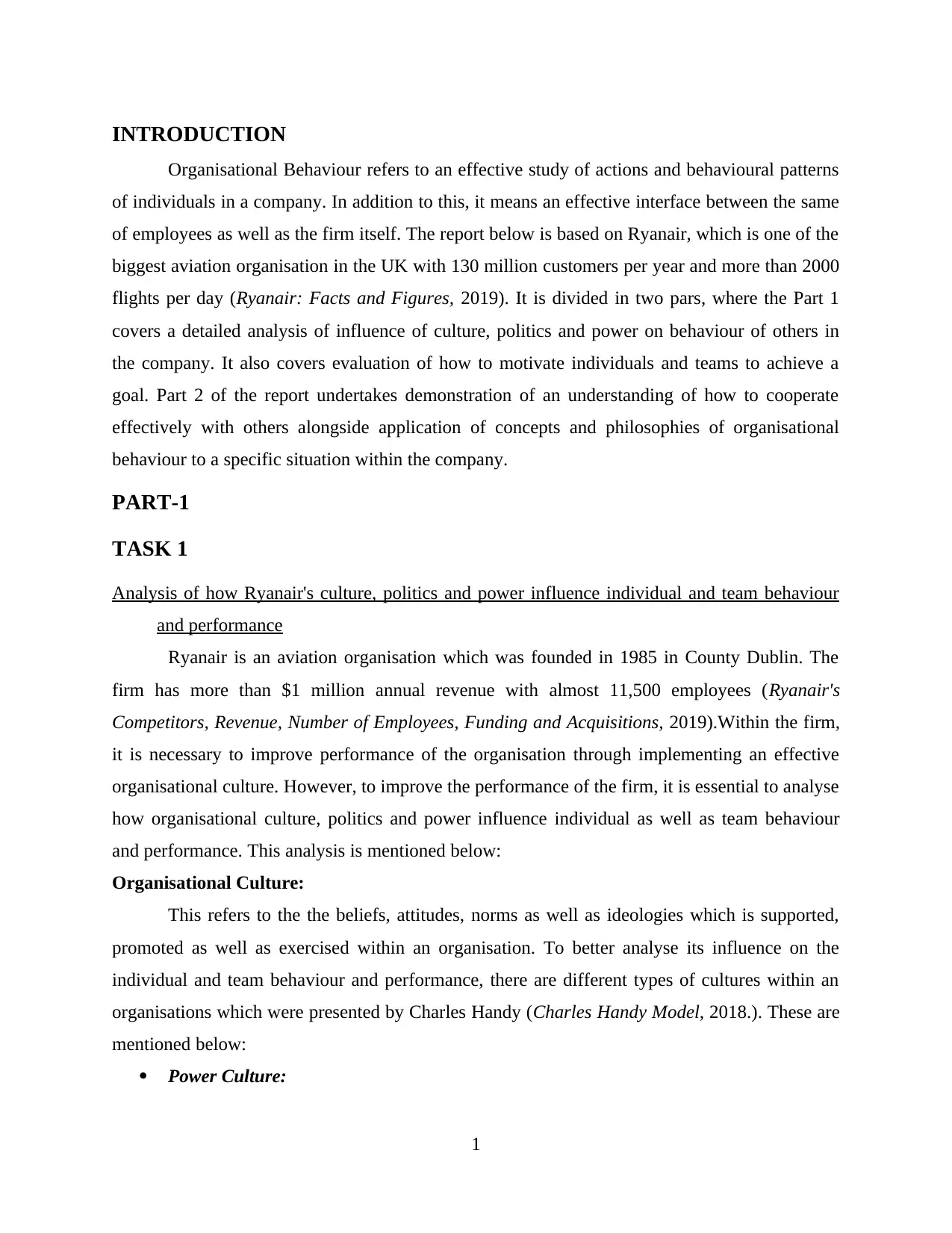
INTRODUCTION
Organisational Behaviour refers to an effective study of actions and behavioural patterns
of individuals in a company. In addition to this, it means an effective interface between the same
of employees as well as the firm itself. The report below is based on Ryanair, which is one of the
biggest aviation organisation in the UK with 130 million customers per year and more than 2000
flights per day (Ryanair: Facts and Figures, 2019). It is divided in two pars, where the Part 1
covers a detailed analysis of influence of culture, politics and power on behaviour of others in
the company. It also covers evaluation of how to motivate individuals and teams to achieve a
goal. Part 2 of the report undertakes demonstration of an understanding of how to cooperate
effectively with others alongside application of concepts and philosophies of organisational
behaviour to a specific situation within the company.
PART-1
TASK 1
Analysis of how Ryanair's culture, politics and power influence individual and team behaviour
and performance
Ryanair is an aviation organisation which was founded in 1985 in County Dublin. The
firm has more than $1 million annual revenue with almost 11,500 employees (Ryanair's
Competitors, Revenue, Number of Employees, Funding and Acquisitions, 2019).Within the firm,
it is necessary to improve performance of the organisation through implementing an effective
organisational culture. However, to improve the performance of the firm, it is essential to analyse
how organisational culture, politics and power influence individual as well as team behaviour
and performance. This analysis is mentioned below:
Organisational Culture:
This refers to the the beliefs, attitudes, norms as well as ideologies which is supported,
promoted as well as exercised within an organisation. To better analyse its influence on the
individual and team behaviour and performance, there are different types of cultures within an
organisations which were presented by Charles Handy (Charles Handy Model, 2018.). These are
mentioned below:
Power Culture:
1
Organisational Behaviour refers to an effective study of actions and behavioural patterns
of individuals in a company. In addition to this, it means an effective interface between the same
of employees as well as the firm itself. The report below is based on Ryanair, which is one of the
biggest aviation organisation in the UK with 130 million customers per year and more than 2000
flights per day (Ryanair: Facts and Figures, 2019). It is divided in two pars, where the Part 1
covers a detailed analysis of influence of culture, politics and power on behaviour of others in
the company. It also covers evaluation of how to motivate individuals and teams to achieve a
goal. Part 2 of the report undertakes demonstration of an understanding of how to cooperate
effectively with others alongside application of concepts and philosophies of organisational
behaviour to a specific situation within the company.
PART-1
TASK 1
Analysis of how Ryanair's culture, politics and power influence individual and team behaviour
and performance
Ryanair is an aviation organisation which was founded in 1985 in County Dublin. The
firm has more than $1 million annual revenue with almost 11,500 employees (Ryanair's
Competitors, Revenue, Number of Employees, Funding and Acquisitions, 2019).Within the firm,
it is necessary to improve performance of the organisation through implementing an effective
organisational culture. However, to improve the performance of the firm, it is essential to analyse
how organisational culture, politics and power influence individual as well as team behaviour
and performance. This analysis is mentioned below:
Organisational Culture:
This refers to the the beliefs, attitudes, norms as well as ideologies which is supported,
promoted as well as exercised within an organisation. To better analyse its influence on the
individual and team behaviour and performance, there are different types of cultures within an
organisations which were presented by Charles Handy (Charles Handy Model, 2018.). These are
mentioned below:
Power Culture:
1
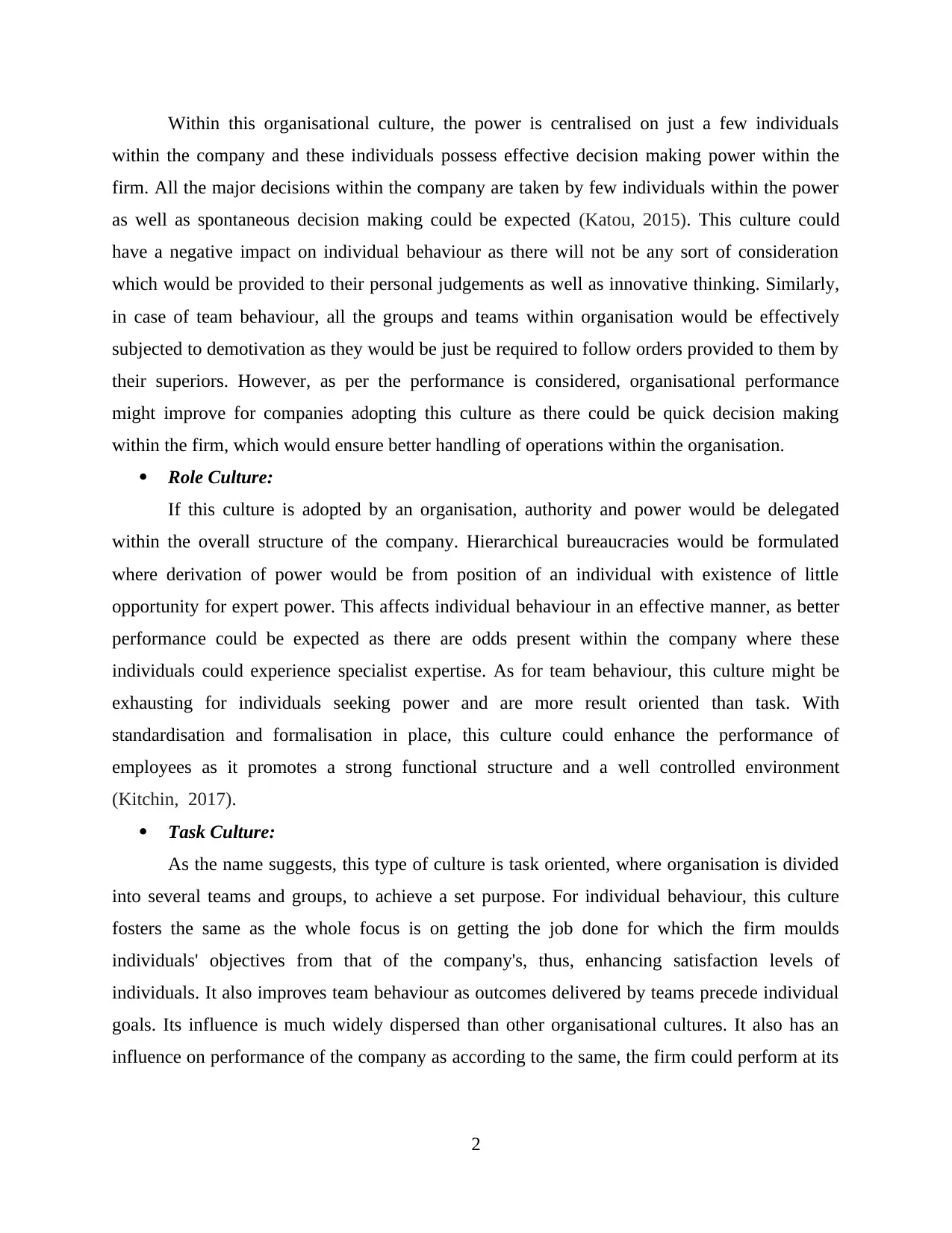
Within this organisational culture, the power is centralised on just a few individuals
within the company and these individuals possess effective decision making power within the
firm. All the major decisions within the company are taken by few individuals within the power
as well as spontaneous decision making could be expected (Katou, 2015). This culture could
have a negative impact on individual behaviour as there will not be any sort of consideration
which would be provided to their personal judgements as well as innovative thinking. Similarly,
in case of team behaviour, all the groups and teams within organisation would be effectively
subjected to demotivation as they would be just be required to follow orders provided to them by
their superiors. However, as per the performance is considered, organisational performance
might improve for companies adopting this culture as there could be quick decision making
within the firm, which would ensure better handling of operations within the organisation.
Role Culture:
If this culture is adopted by an organisation, authority and power would be delegated
within the overall structure of the company. Hierarchical bureaucracies would be formulated
where derivation of power would be from position of an individual with existence of little
opportunity for expert power. This affects individual behaviour in an effective manner, as better
performance could be expected as there are odds present within the company where these
individuals could experience specialist expertise. As for team behaviour, this culture might be
exhausting for individuals seeking power and are more result oriented than task. With
standardisation and formalisation in place, this culture could enhance the performance of
employees as it promotes a strong functional structure and a well controlled environment
(Kitchin, 2017).
Task Culture:
As the name suggests, this type of culture is task oriented, where organisation is divided
into several teams and groups, to achieve a set purpose. For individual behaviour, this culture
fosters the same as the whole focus is on getting the job done for which the firm moulds
individuals' objectives from that of the company's, thus, enhancing satisfaction levels of
individuals. It also improves team behaviour as outcomes delivered by teams precede individual
goals. Its influence is much widely dispersed than other organisational cultures. It also has an
influence on performance of the company as according to the same, the firm could perform at its
2
within the company and these individuals possess effective decision making power within the
firm. All the major decisions within the company are taken by few individuals within the power
as well as spontaneous decision making could be expected (Katou, 2015). This culture could
have a negative impact on individual behaviour as there will not be any sort of consideration
which would be provided to their personal judgements as well as innovative thinking. Similarly,
in case of team behaviour, all the groups and teams within organisation would be effectively
subjected to demotivation as they would be just be required to follow orders provided to them by
their superiors. However, as per the performance is considered, organisational performance
might improve for companies adopting this culture as there could be quick decision making
within the firm, which would ensure better handling of operations within the organisation.
Role Culture:
If this culture is adopted by an organisation, authority and power would be delegated
within the overall structure of the company. Hierarchical bureaucracies would be formulated
where derivation of power would be from position of an individual with existence of little
opportunity for expert power. This affects individual behaviour in an effective manner, as better
performance could be expected as there are odds present within the company where these
individuals could experience specialist expertise. As for team behaviour, this culture might be
exhausting for individuals seeking power and are more result oriented than task. With
standardisation and formalisation in place, this culture could enhance the performance of
employees as it promotes a strong functional structure and a well controlled environment
(Kitchin, 2017).
Task Culture:
As the name suggests, this type of culture is task oriented, where organisation is divided
into several teams and groups, to achieve a set purpose. For individual behaviour, this culture
fosters the same as the whole focus is on getting the job done for which the firm moulds
individuals' objectives from that of the company's, thus, enhancing satisfaction levels of
individuals. It also improves team behaviour as outcomes delivered by teams precede individual
goals. Its influence is much widely dispersed than other organisational cultures. It also has an
influence on performance of the company as according to the same, the firm could perform at its
2
Secure Best Marks with AI Grader
Need help grading? Try our AI Grader for instant feedback on your assignments.
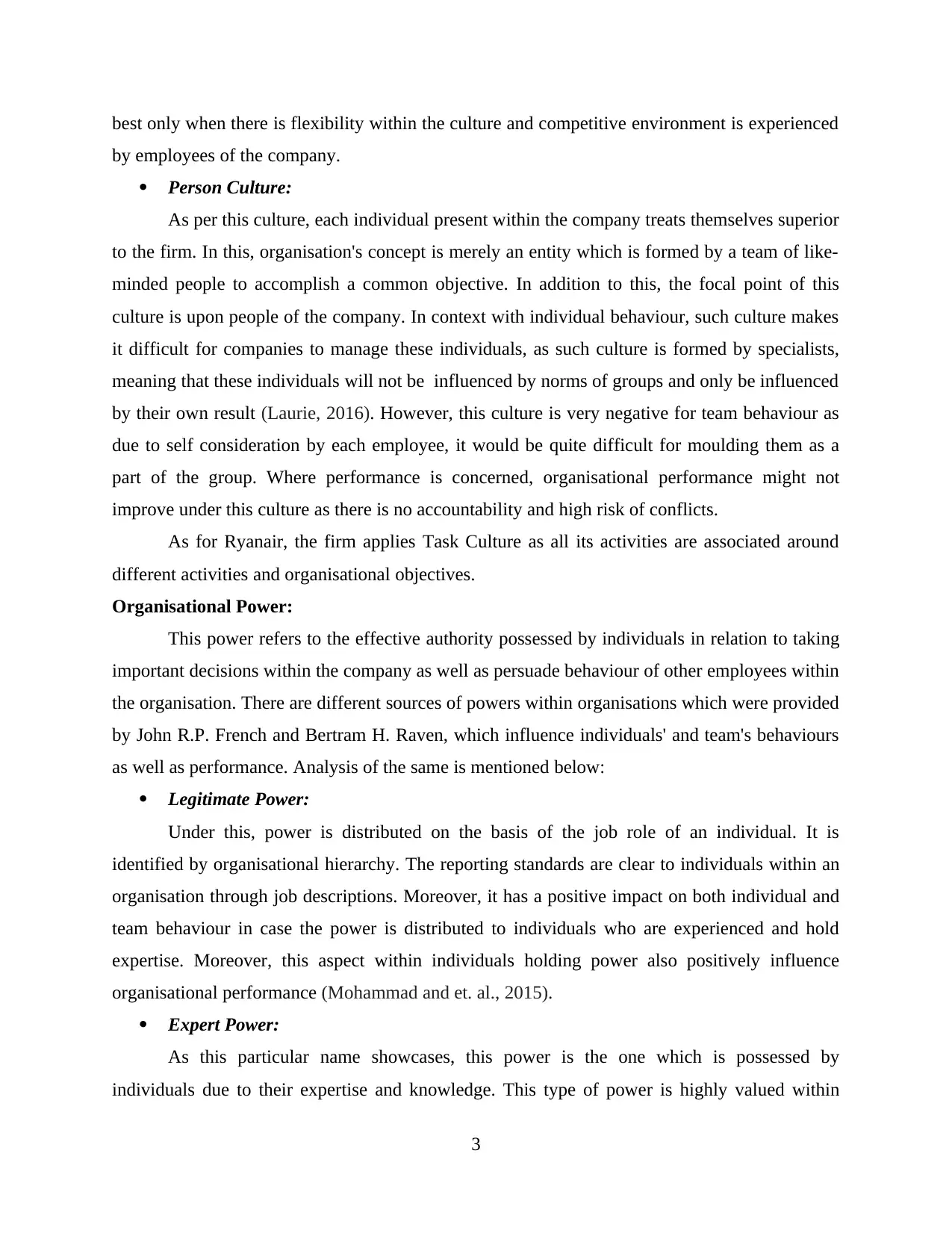
best only when there is flexibility within the culture and competitive environment is experienced
by employees of the company.
Person Culture:
As per this culture, each individual present within the company treats themselves superior
to the firm. In this, organisation's concept is merely an entity which is formed by a team of like-
minded people to accomplish a common objective. In addition to this, the focal point of this
culture is upon people of the company. In context with individual behaviour, such culture makes
it difficult for companies to manage these individuals, as such culture is formed by specialists,
meaning that these individuals will not be influenced by norms of groups and only be influenced
by their own result (Laurie, 2016). However, this culture is very negative for team behaviour as
due to self consideration by each employee, it would be quite difficult for moulding them as a
part of the group. Where performance is concerned, organisational performance might not
improve under this culture as there is no accountability and high risk of conflicts.
As for Ryanair, the firm applies Task Culture as all its activities are associated around
different activities and organisational objectives.
Organisational Power:
This power refers to the effective authority possessed by individuals in relation to taking
important decisions within the company as well as persuade behaviour of other employees within
the organisation. There are different sources of powers within organisations which were provided
by John R.P. French and Bertram H. Raven, which influence individuals' and team's behaviours
as well as performance. Analysis of the same is mentioned below:
Legitimate Power:
Under this, power is distributed on the basis of the job role of an individual. It is
identified by organisational hierarchy. The reporting standards are clear to individuals within an
organisation through job descriptions. Moreover, it has a positive impact on both individual and
team behaviour in case the power is distributed to individuals who are experienced and hold
expertise. Moreover, this aspect within individuals holding power also positively influence
organisational performance (Mohammad and et. al., 2015).
Expert Power:
As this particular name showcases, this power is the one which is possessed by
individuals due to their expertise and knowledge. This type of power is highly valued within
3
by employees of the company.
Person Culture:
As per this culture, each individual present within the company treats themselves superior
to the firm. In this, organisation's concept is merely an entity which is formed by a team of like-
minded people to accomplish a common objective. In addition to this, the focal point of this
culture is upon people of the company. In context with individual behaviour, such culture makes
it difficult for companies to manage these individuals, as such culture is formed by specialists,
meaning that these individuals will not be influenced by norms of groups and only be influenced
by their own result (Laurie, 2016). However, this culture is very negative for team behaviour as
due to self consideration by each employee, it would be quite difficult for moulding them as a
part of the group. Where performance is concerned, organisational performance might not
improve under this culture as there is no accountability and high risk of conflicts.
As for Ryanair, the firm applies Task Culture as all its activities are associated around
different activities and organisational objectives.
Organisational Power:
This power refers to the effective authority possessed by individuals in relation to taking
important decisions within the company as well as persuade behaviour of other employees within
the organisation. There are different sources of powers within organisations which were provided
by John R.P. French and Bertram H. Raven, which influence individuals' and team's behaviours
as well as performance. Analysis of the same is mentioned below:
Legitimate Power:
Under this, power is distributed on the basis of the job role of an individual. It is
identified by organisational hierarchy. The reporting standards are clear to individuals within an
organisation through job descriptions. Moreover, it has a positive impact on both individual and
team behaviour in case the power is distributed to individuals who are experienced and hold
expertise. Moreover, this aspect within individuals holding power also positively influence
organisational performance (Mohammad and et. al., 2015).
Expert Power:
As this particular name showcases, this power is the one which is possessed by
individuals due to their expertise and knowledge. This type of power is highly valued within
3
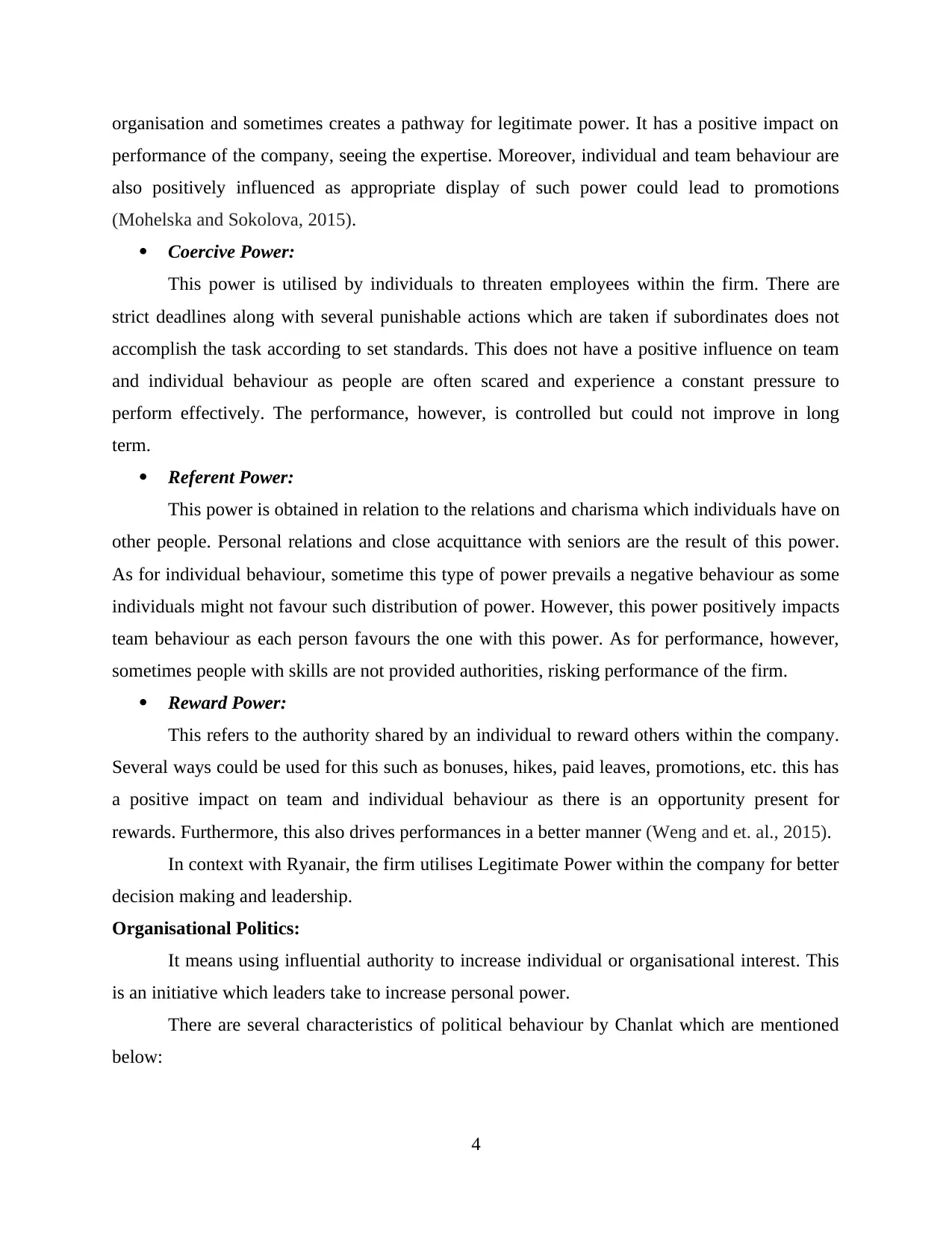
organisation and sometimes creates a pathway for legitimate power. It has a positive impact on
performance of the company, seeing the expertise. Moreover, individual and team behaviour are
also positively influenced as appropriate display of such power could lead to promotions
(Mohelska and Sokolova, 2015).
Coercive Power:
This power is utilised by individuals to threaten employees within the firm. There are
strict deadlines along with several punishable actions which are taken if subordinates does not
accomplish the task according to set standards. This does not have a positive influence on team
and individual behaviour as people are often scared and experience a constant pressure to
perform effectively. The performance, however, is controlled but could not improve in long
term.
Referent Power:
This power is obtained in relation to the relations and charisma which individuals have on
other people. Personal relations and close acquittance with seniors are the result of this power.
As for individual behaviour, sometime this type of power prevails a negative behaviour as some
individuals might not favour such distribution of power. However, this power positively impacts
team behaviour as each person favours the one with this power. As for performance, however,
sometimes people with skills are not provided authorities, risking performance of the firm.
Reward Power:
This refers to the authority shared by an individual to reward others within the company.
Several ways could be used for this such as bonuses, hikes, paid leaves, promotions, etc. this has
a positive impact on team and individual behaviour as there is an opportunity present for
rewards. Furthermore, this also drives performances in a better manner (Weng and et. al., 2015).
In context with Ryanair, the firm utilises Legitimate Power within the company for better
decision making and leadership.
Organisational Politics:
It means using influential authority to increase individual or organisational interest. This
is an initiative which leaders take to increase personal power.
There are several characteristics of political behaviour by Chanlat which are mentioned
below:
4
performance of the company, seeing the expertise. Moreover, individual and team behaviour are
also positively influenced as appropriate display of such power could lead to promotions
(Mohelska and Sokolova, 2015).
Coercive Power:
This power is utilised by individuals to threaten employees within the firm. There are
strict deadlines along with several punishable actions which are taken if subordinates does not
accomplish the task according to set standards. This does not have a positive influence on team
and individual behaviour as people are often scared and experience a constant pressure to
perform effectively. The performance, however, is controlled but could not improve in long
term.
Referent Power:
This power is obtained in relation to the relations and charisma which individuals have on
other people. Personal relations and close acquittance with seniors are the result of this power.
As for individual behaviour, sometime this type of power prevails a negative behaviour as some
individuals might not favour such distribution of power. However, this power positively impacts
team behaviour as each person favours the one with this power. As for performance, however,
sometimes people with skills are not provided authorities, risking performance of the firm.
Reward Power:
This refers to the authority shared by an individual to reward others within the company.
Several ways could be used for this such as bonuses, hikes, paid leaves, promotions, etc. this has
a positive impact on team and individual behaviour as there is an opportunity present for
rewards. Furthermore, this also drives performances in a better manner (Weng and et. al., 2015).
In context with Ryanair, the firm utilises Legitimate Power within the company for better
decision making and leadership.
Organisational Politics:
It means using influential authority to increase individual or organisational interest. This
is an initiative which leaders take to increase personal power.
There are several characteristics of political behaviour by Chanlat which are mentioned
below:
4
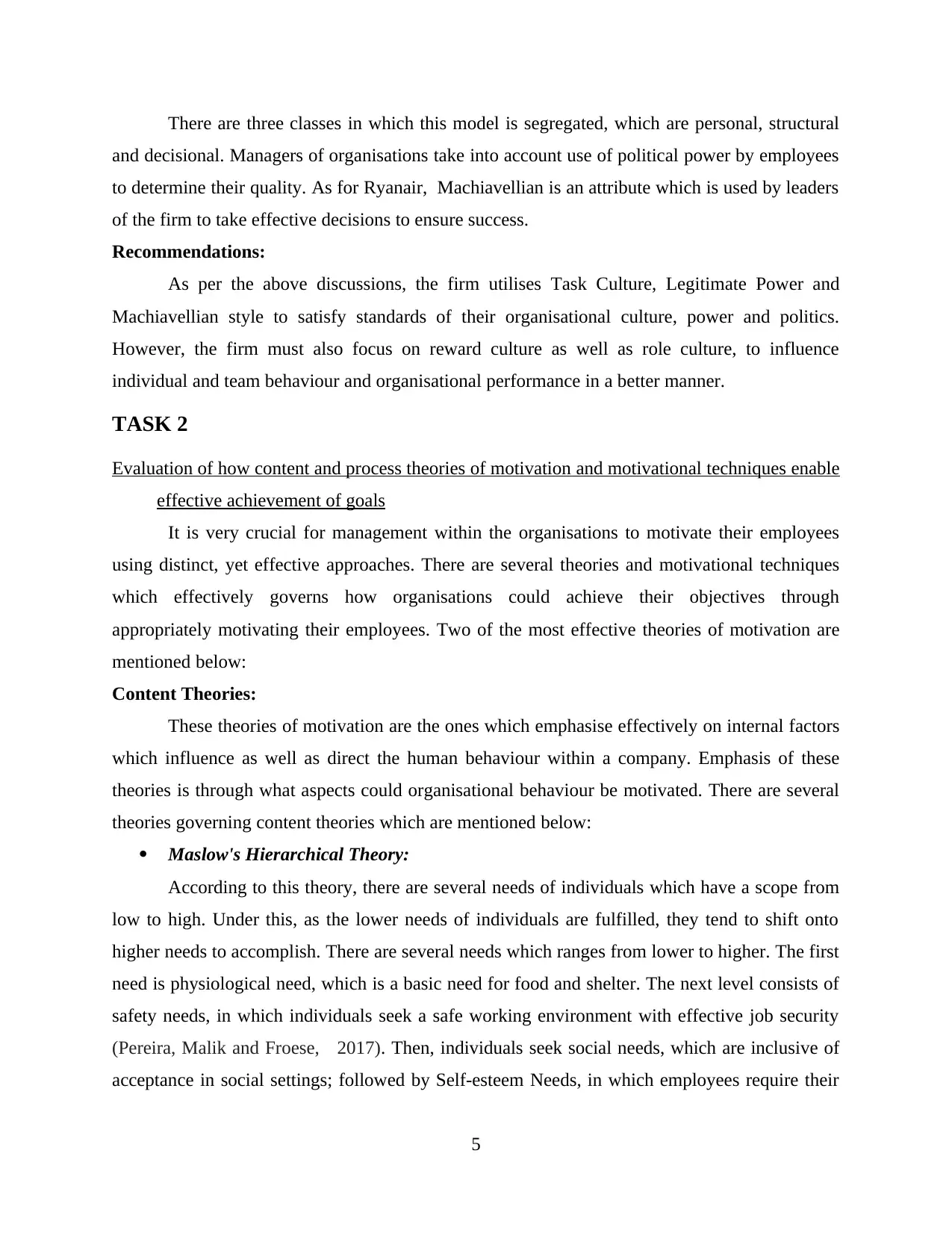
There are three classes in which this model is segregated, which are personal, structural
and decisional. Managers of organisations take into account use of political power by employees
to determine their quality. As for Ryanair, Machiavellian is an attribute which is used by leaders
of the firm to take effective decisions to ensure success.
Recommendations:
As per the above discussions, the firm utilises Task Culture, Legitimate Power and
Machiavellian style to satisfy standards of their organisational culture, power and politics.
However, the firm must also focus on reward culture as well as role culture, to influence
individual and team behaviour and organisational performance in a better manner.
TASK 2
Evaluation of how content and process theories of motivation and motivational techniques enable
effective achievement of goals
It is very crucial for management within the organisations to motivate their employees
using distinct, yet effective approaches. There are several theories and motivational techniques
which effectively governs how organisations could achieve their objectives through
appropriately motivating their employees. Two of the most effective theories of motivation are
mentioned below:
Content Theories:
These theories of motivation are the ones which emphasise effectively on internal factors
which influence as well as direct the human behaviour within a company. Emphasis of these
theories is through what aspects could organisational behaviour be motivated. There are several
theories governing content theories which are mentioned below:
Maslow's Hierarchical Theory:
According to this theory, there are several needs of individuals which have a scope from
low to high. Under this, as the lower needs of individuals are fulfilled, they tend to shift onto
higher needs to accomplish. There are several needs which ranges from lower to higher. The first
need is physiological need, which is a basic need for food and shelter. The next level consists of
safety needs, in which individuals seek a safe working environment with effective job security
(Pereira, Malik and Froese, 2017). Then, individuals seek social needs, which are inclusive of
acceptance in social settings; followed by Self-esteem Needs, in which employees require their
5
and decisional. Managers of organisations take into account use of political power by employees
to determine their quality. As for Ryanair, Machiavellian is an attribute which is used by leaders
of the firm to take effective decisions to ensure success.
Recommendations:
As per the above discussions, the firm utilises Task Culture, Legitimate Power and
Machiavellian style to satisfy standards of their organisational culture, power and politics.
However, the firm must also focus on reward culture as well as role culture, to influence
individual and team behaviour and organisational performance in a better manner.
TASK 2
Evaluation of how content and process theories of motivation and motivational techniques enable
effective achievement of goals
It is very crucial for management within the organisations to motivate their employees
using distinct, yet effective approaches. There are several theories and motivational techniques
which effectively governs how organisations could achieve their objectives through
appropriately motivating their employees. Two of the most effective theories of motivation are
mentioned below:
Content Theories:
These theories of motivation are the ones which emphasise effectively on internal factors
which influence as well as direct the human behaviour within a company. Emphasis of these
theories is through what aspects could organisational behaviour be motivated. There are several
theories governing content theories which are mentioned below:
Maslow's Hierarchical Theory:
According to this theory, there are several needs of individuals which have a scope from
low to high. Under this, as the lower needs of individuals are fulfilled, they tend to shift onto
higher needs to accomplish. There are several needs which ranges from lower to higher. The first
need is physiological need, which is a basic need for food and shelter. The next level consists of
safety needs, in which individuals seek a safe working environment with effective job security
(Pereira, Malik and Froese, 2017). Then, individuals seek social needs, which are inclusive of
acceptance in social settings; followed by Self-esteem Needs, in which employees require their
5
Paraphrase This Document
Need a fresh take? Get an instant paraphrase of this document with our AI Paraphraser
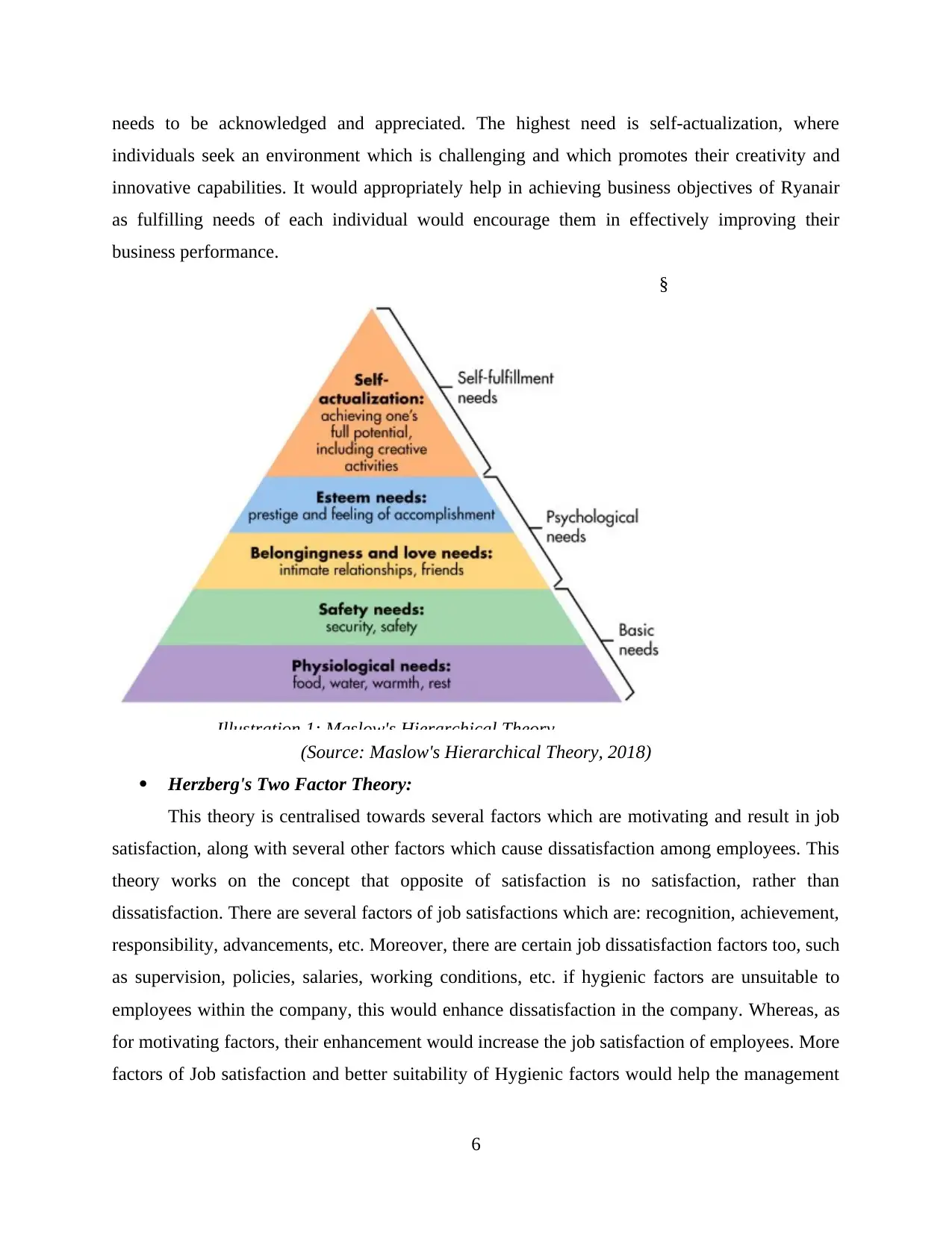
needs to be acknowledged and appreciated. The highest need is self-actualization, where
individuals seek an environment which is challenging and which promotes their creativity and
innovative capabilities. It would appropriately help in achieving business objectives of Ryanair
as fulfilling needs of each individual would encourage them in effectively improving their
business performance.
Illustration 1: Maslow's Hierarchical Theory
§
(Source: Maslow's Hierarchical Theory, 2018)
Herzberg's Two Factor Theory:
This theory is centralised towards several factors which are motivating and result in job
satisfaction, along with several other factors which cause dissatisfaction among employees. This
theory works on the concept that opposite of satisfaction is no satisfaction, rather than
dissatisfaction. There are several factors of job satisfactions which are: recognition, achievement,
responsibility, advancements, etc. Moreover, there are certain job dissatisfaction factors too, such
as supervision, policies, salaries, working conditions, etc. if hygienic factors are unsuitable to
employees within the company, this would enhance dissatisfaction in the company. Whereas, as
for motivating factors, their enhancement would increase the job satisfaction of employees. More
factors of Job satisfaction and better suitability of Hygienic factors would help the management
6
individuals seek an environment which is challenging and which promotes their creativity and
innovative capabilities. It would appropriately help in achieving business objectives of Ryanair
as fulfilling needs of each individual would encourage them in effectively improving their
business performance.
Illustration 1: Maslow's Hierarchical Theory
§
(Source: Maslow's Hierarchical Theory, 2018)
Herzberg's Two Factor Theory:
This theory is centralised towards several factors which are motivating and result in job
satisfaction, along with several other factors which cause dissatisfaction among employees. This
theory works on the concept that opposite of satisfaction is no satisfaction, rather than
dissatisfaction. There are several factors of job satisfactions which are: recognition, achievement,
responsibility, advancements, etc. Moreover, there are certain job dissatisfaction factors too, such
as supervision, policies, salaries, working conditions, etc. if hygienic factors are unsuitable to
employees within the company, this would enhance dissatisfaction in the company. Whereas, as
for motivating factors, their enhancement would increase the job satisfaction of employees. More
factors of Job satisfaction and better suitability of Hygienic factors would help the management
6
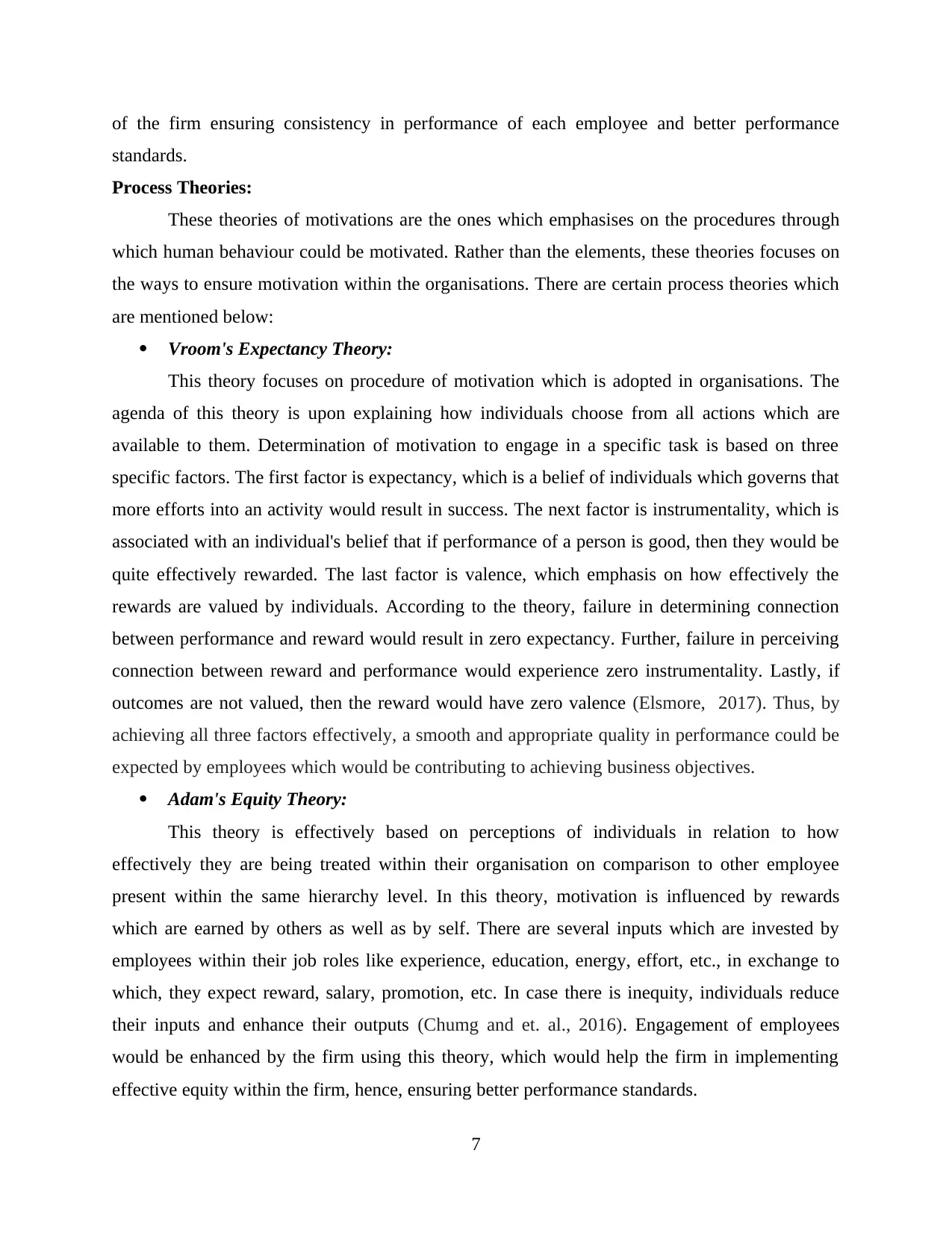
of the firm ensuring consistency in performance of each employee and better performance
standards.
Process Theories:
These theories of motivations are the ones which emphasises on the procedures through
which human behaviour could be motivated. Rather than the elements, these theories focuses on
the ways to ensure motivation within the organisations. There are certain process theories which
are mentioned below:
Vroom's Expectancy Theory:
This theory focuses on procedure of motivation which is adopted in organisations. The
agenda of this theory is upon explaining how individuals choose from all actions which are
available to them. Determination of motivation to engage in a specific task is based on three
specific factors. The first factor is expectancy, which is a belief of individuals which governs that
more efforts into an activity would result in success. The next factor is instrumentality, which is
associated with an individual's belief that if performance of a person is good, then they would be
quite effectively rewarded. The last factor is valence, which emphasis on how effectively the
rewards are valued by individuals. According to the theory, failure in determining connection
between performance and reward would result in zero expectancy. Further, failure in perceiving
connection between reward and performance would experience zero instrumentality. Lastly, if
outcomes are not valued, then the reward would have zero valence (Elsmore, 2017). Thus, by
achieving all three factors effectively, a smooth and appropriate quality in performance could be
expected by employees which would be contributing to achieving business objectives.
Adam's Equity Theory:
This theory is effectively based on perceptions of individuals in relation to how
effectively they are being treated within their organisation on comparison to other employee
present within the same hierarchy level. In this theory, motivation is influenced by rewards
which are earned by others as well as by self. There are several inputs which are invested by
employees within their job roles like experience, education, energy, effort, etc., in exchange to
which, they expect reward, salary, promotion, etc. In case there is inequity, individuals reduce
their inputs and enhance their outputs (Chumg and et. al., 2016). Engagement of employees
would be enhanced by the firm using this theory, which would help the firm in implementing
effective equity within the firm, hence, ensuring better performance standards.
7
standards.
Process Theories:
These theories of motivations are the ones which emphasises on the procedures through
which human behaviour could be motivated. Rather than the elements, these theories focuses on
the ways to ensure motivation within the organisations. There are certain process theories which
are mentioned below:
Vroom's Expectancy Theory:
This theory focuses on procedure of motivation which is adopted in organisations. The
agenda of this theory is upon explaining how individuals choose from all actions which are
available to them. Determination of motivation to engage in a specific task is based on three
specific factors. The first factor is expectancy, which is a belief of individuals which governs that
more efforts into an activity would result in success. The next factor is instrumentality, which is
associated with an individual's belief that if performance of a person is good, then they would be
quite effectively rewarded. The last factor is valence, which emphasis on how effectively the
rewards are valued by individuals. According to the theory, failure in determining connection
between performance and reward would result in zero expectancy. Further, failure in perceiving
connection between reward and performance would experience zero instrumentality. Lastly, if
outcomes are not valued, then the reward would have zero valence (Elsmore, 2017). Thus, by
achieving all three factors effectively, a smooth and appropriate quality in performance could be
expected by employees which would be contributing to achieving business objectives.
Adam's Equity Theory:
This theory is effectively based on perceptions of individuals in relation to how
effectively they are being treated within their organisation on comparison to other employee
present within the same hierarchy level. In this theory, motivation is influenced by rewards
which are earned by others as well as by self. There are several inputs which are invested by
employees within their job roles like experience, education, energy, effort, etc., in exchange to
which, they expect reward, salary, promotion, etc. In case there is inequity, individuals reduce
their inputs and enhance their outputs (Chumg and et. al., 2016). Engagement of employees
would be enhanced by the firm using this theory, which would help the firm in implementing
effective equity within the firm, hence, ensuring better performance standards.
7
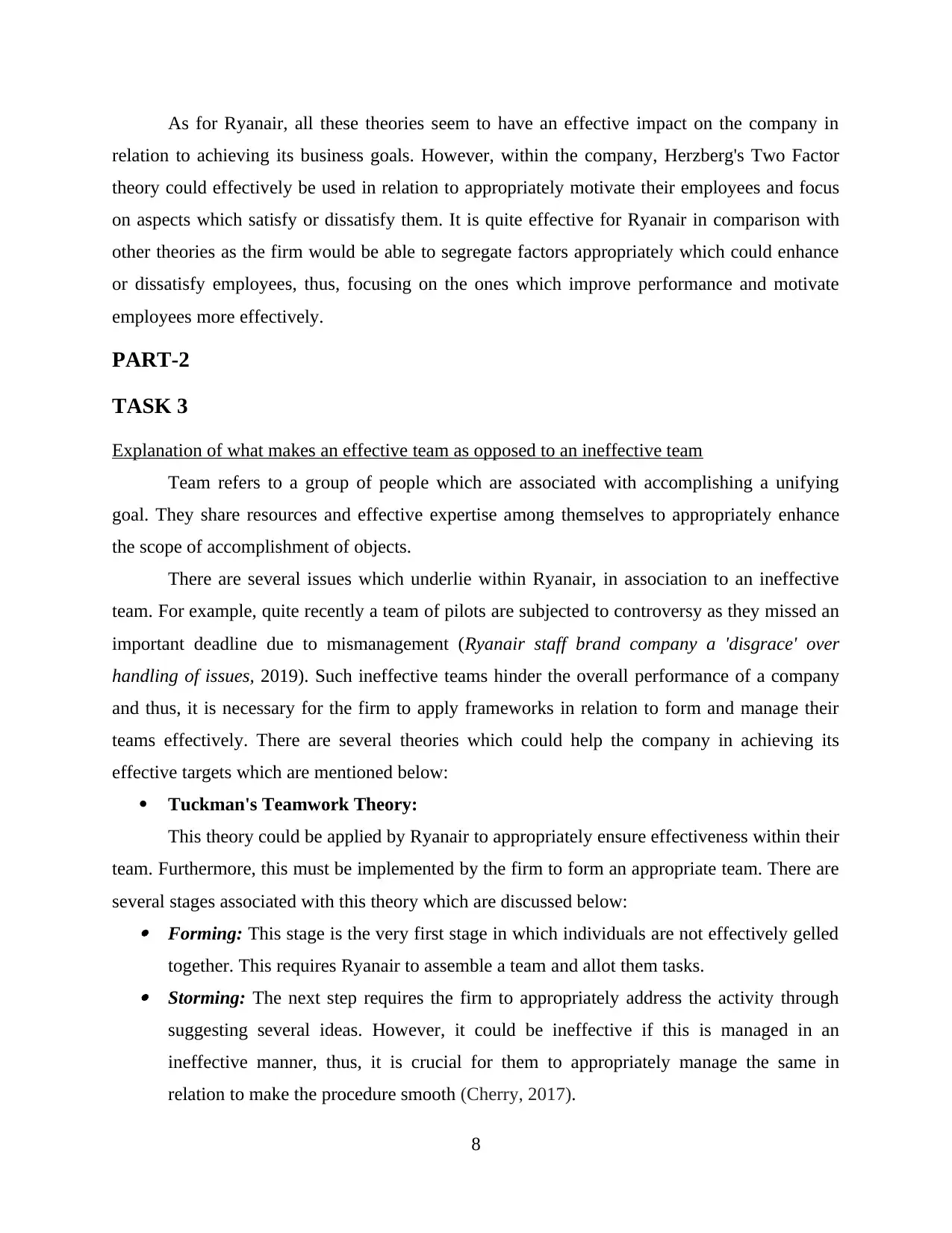
As for Ryanair, all these theories seem to have an effective impact on the company in
relation to achieving its business goals. However, within the company, Herzberg's Two Factor
theory could effectively be used in relation to appropriately motivate their employees and focus
on aspects which satisfy or dissatisfy them. It is quite effective for Ryanair in comparison with
other theories as the firm would be able to segregate factors appropriately which could enhance
or dissatisfy employees, thus, focusing on the ones which improve performance and motivate
employees more effectively.
PART-2
TASK 3
Explanation of what makes an effective team as opposed to an ineffective team
Team refers to a group of people which are associated with accomplishing a unifying
goal. They share resources and effective expertise among themselves to appropriately enhance
the scope of accomplishment of objects.
There are several issues which underlie within Ryanair, in association to an ineffective
team. For example, quite recently a team of pilots are subjected to controversy as they missed an
important deadline due to mismanagement (Ryanair staff brand company a 'disgrace' over
handling of issues, 2019). Such ineffective teams hinder the overall performance of a company
and thus, it is necessary for the firm to apply frameworks in relation to form and manage their
teams effectively. There are several theories which could help the company in achieving its
effective targets which are mentioned below:
Tuckman's Teamwork Theory:
This theory could be applied by Ryanair to appropriately ensure effectiveness within their
team. Furthermore, this must be implemented by the firm to form an appropriate team. There are
several stages associated with this theory which are discussed below: Forming: This stage is the very first stage in which individuals are not effectively gelled
together. This requires Ryanair to assemble a team and allot them tasks. Storming: The next step requires the firm to appropriately address the activity through
suggesting several ideas. However, it could be ineffective if this is managed in an
ineffective manner, thus, it is crucial for them to appropriately manage the same in
relation to make the procedure smooth (Cherry, 2017).
8
relation to achieving its business goals. However, within the company, Herzberg's Two Factor
theory could effectively be used in relation to appropriately motivate their employees and focus
on aspects which satisfy or dissatisfy them. It is quite effective for Ryanair in comparison with
other theories as the firm would be able to segregate factors appropriately which could enhance
or dissatisfy employees, thus, focusing on the ones which improve performance and motivate
employees more effectively.
PART-2
TASK 3
Explanation of what makes an effective team as opposed to an ineffective team
Team refers to a group of people which are associated with accomplishing a unifying
goal. They share resources and effective expertise among themselves to appropriately enhance
the scope of accomplishment of objects.
There are several issues which underlie within Ryanair, in association to an ineffective
team. For example, quite recently a team of pilots are subjected to controversy as they missed an
important deadline due to mismanagement (Ryanair staff brand company a 'disgrace' over
handling of issues, 2019). Such ineffective teams hinder the overall performance of a company
and thus, it is necessary for the firm to apply frameworks in relation to form and manage their
teams effectively. There are several theories which could help the company in achieving its
effective targets which are mentioned below:
Tuckman's Teamwork Theory:
This theory could be applied by Ryanair to appropriately ensure effectiveness within their
team. Furthermore, this must be implemented by the firm to form an appropriate team. There are
several stages associated with this theory which are discussed below: Forming: This stage is the very first stage in which individuals are not effectively gelled
together. This requires Ryanair to assemble a team and allot them tasks. Storming: The next step requires the firm to appropriately address the activity through
suggesting several ideas. However, it could be ineffective if this is managed in an
ineffective manner, thus, it is crucial for them to appropriately manage the same in
relation to make the procedure smooth (Cherry, 2017).
8
Secure Best Marks with AI Grader
Need help grading? Try our AI Grader for instant feedback on your assignments.
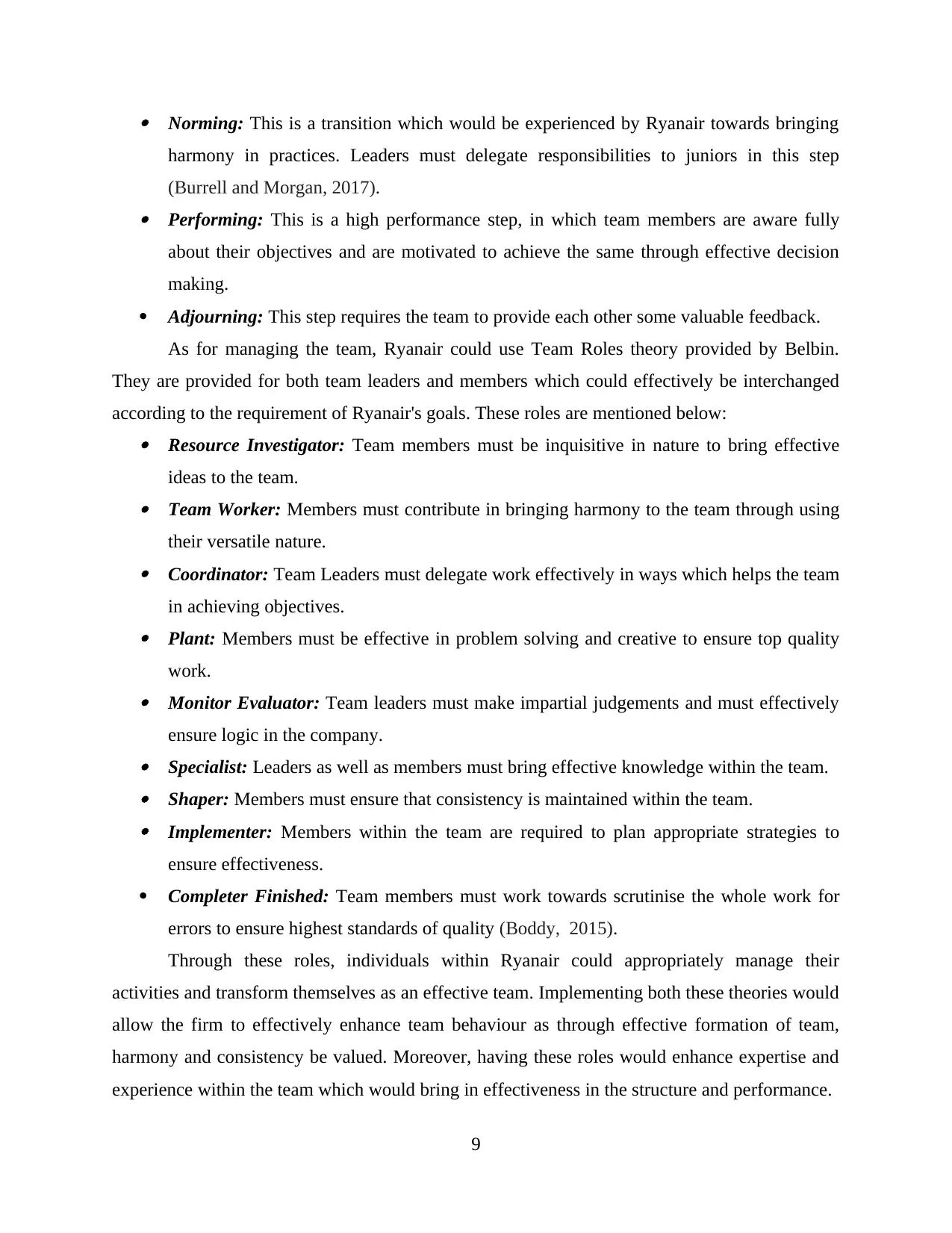
Norming: This is a transition which would be experienced by Ryanair towards bringing
harmony in practices. Leaders must delegate responsibilities to juniors in this step
(Burrell and Morgan, 2017). Performing: This is a high performance step, in which team members are aware fully
about their objectives and are motivated to achieve the same through effective decision
making.
Adjourning: This step requires the team to provide each other some valuable feedback.
As for managing the team, Ryanair could use Team Roles theory provided by Belbin.
They are provided for both team leaders and members which could effectively be interchanged
according to the requirement of Ryanair's goals. These roles are mentioned below: Resource Investigator: Team members must be inquisitive in nature to bring effective
ideas to the team. Team Worker: Members must contribute in bringing harmony to the team through using
their versatile nature. Coordinator: Team Leaders must delegate work effectively in ways which helps the team
in achieving objectives. Plant: Members must be effective in problem solving and creative to ensure top quality
work. Monitor Evaluator: Team leaders must make impartial judgements and must effectively
ensure logic in the company. Specialist: Leaders as well as members must bring effective knowledge within the team. Shaper: Members must ensure that consistency is maintained within the team. Implementer: Members within the team are required to plan appropriate strategies to
ensure effectiveness.
Completer Finished: Team members must work towards scrutinise the whole work for
errors to ensure highest standards of quality (Boddy, 2015).
Through these roles, individuals within Ryanair could appropriately manage their
activities and transform themselves as an effective team. Implementing both these theories would
allow the firm to effectively enhance team behaviour as through effective formation of team,
harmony and consistency be valued. Moreover, having these roles would enhance expertise and
experience within the team which would bring in effectiveness in the structure and performance.
9
harmony in practices. Leaders must delegate responsibilities to juniors in this step
(Burrell and Morgan, 2017). Performing: This is a high performance step, in which team members are aware fully
about their objectives and are motivated to achieve the same through effective decision
making.
Adjourning: This step requires the team to provide each other some valuable feedback.
As for managing the team, Ryanair could use Team Roles theory provided by Belbin.
They are provided for both team leaders and members which could effectively be interchanged
according to the requirement of Ryanair's goals. These roles are mentioned below: Resource Investigator: Team members must be inquisitive in nature to bring effective
ideas to the team. Team Worker: Members must contribute in bringing harmony to the team through using
their versatile nature. Coordinator: Team Leaders must delegate work effectively in ways which helps the team
in achieving objectives. Plant: Members must be effective in problem solving and creative to ensure top quality
work. Monitor Evaluator: Team leaders must make impartial judgements and must effectively
ensure logic in the company. Specialist: Leaders as well as members must bring effective knowledge within the team. Shaper: Members must ensure that consistency is maintained within the team. Implementer: Members within the team are required to plan appropriate strategies to
ensure effectiveness.
Completer Finished: Team members must work towards scrutinise the whole work for
errors to ensure highest standards of quality (Boddy, 2015).
Through these roles, individuals within Ryanair could appropriately manage their
activities and transform themselves as an effective team. Implementing both these theories would
allow the firm to effectively enhance team behaviour as through effective formation of team,
harmony and consistency be valued. Moreover, having these roles would enhance expertise and
experience within the team which would bring in effectiveness in the structure and performance.
9
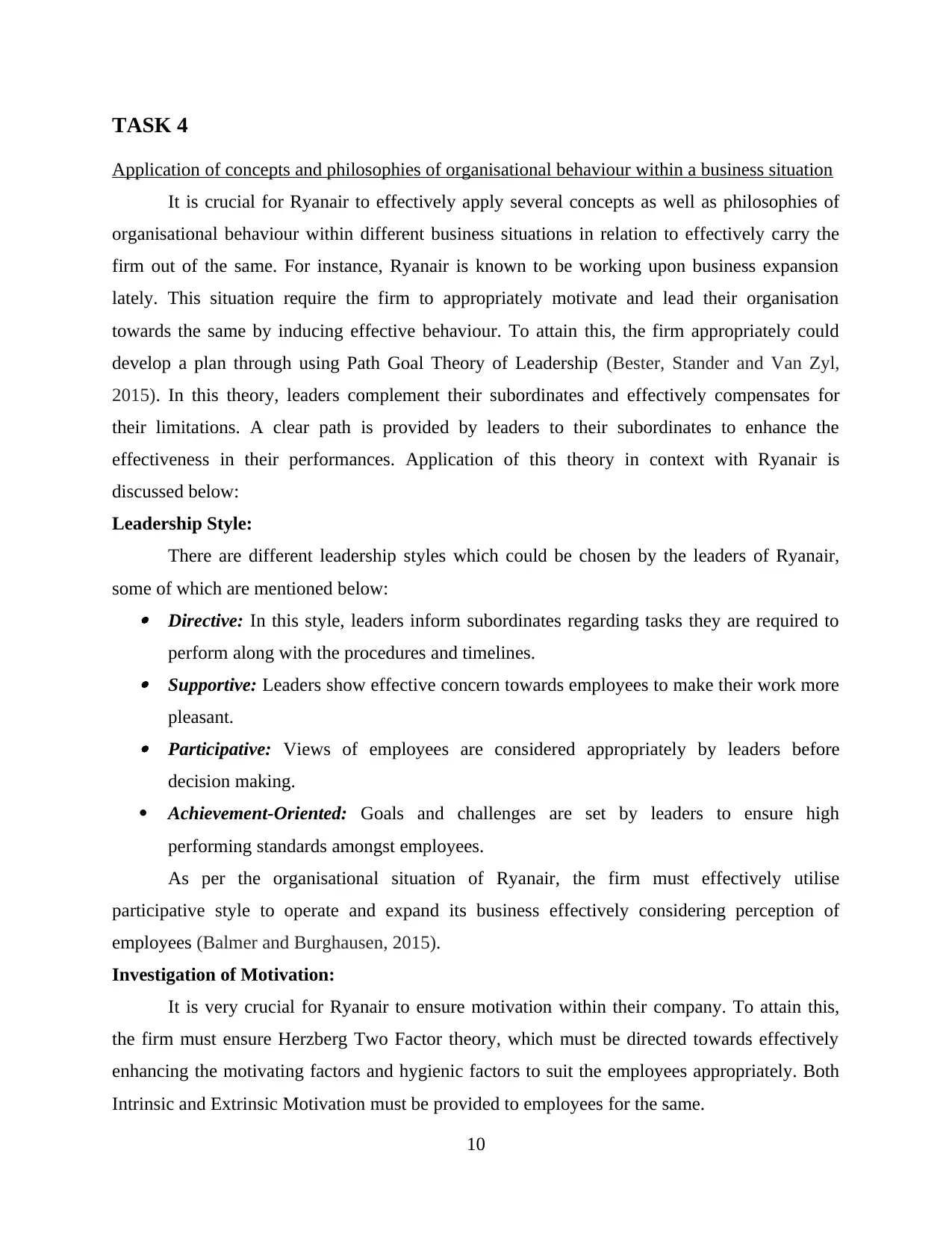
TASK 4
Application of concepts and philosophies of organisational behaviour within a business situation
It is crucial for Ryanair to effectively apply several concepts as well as philosophies of
organisational behaviour within different business situations in relation to effectively carry the
firm out of the same. For instance, Ryanair is known to be working upon business expansion
lately. This situation require the firm to appropriately motivate and lead their organisation
towards the same by inducing effective behaviour. To attain this, the firm appropriately could
develop a plan through using Path Goal Theory of Leadership (Bester, Stander and Van Zyl,
2015). In this theory, leaders complement their subordinates and effectively compensates for
their limitations. A clear path is provided by leaders to their subordinates to enhance the
effectiveness in their performances. Application of this theory in context with Ryanair is
discussed below:
Leadership Style:
There are different leadership styles which could be chosen by the leaders of Ryanair,
some of which are mentioned below: Directive: In this style, leaders inform subordinates regarding tasks they are required to
perform along with the procedures and timelines. Supportive: Leaders show effective concern towards employees to make their work more
pleasant. Participative: Views of employees are considered appropriately by leaders before
decision making.
Achievement-Oriented: Goals and challenges are set by leaders to ensure high
performing standards amongst employees.
As per the organisational situation of Ryanair, the firm must effectively utilise
participative style to operate and expand its business effectively considering perception of
employees (Balmer and Burghausen, 2015).
Investigation of Motivation:
It is very crucial for Ryanair to ensure motivation within their company. To attain this,
the firm must ensure Herzberg Two Factor theory, which must be directed towards effectively
enhancing the motivating factors and hygienic factors to suit the employees appropriately. Both
Intrinsic and Extrinsic Motivation must be provided to employees for the same.
10
Application of concepts and philosophies of organisational behaviour within a business situation
It is crucial for Ryanair to effectively apply several concepts as well as philosophies of
organisational behaviour within different business situations in relation to effectively carry the
firm out of the same. For instance, Ryanair is known to be working upon business expansion
lately. This situation require the firm to appropriately motivate and lead their organisation
towards the same by inducing effective behaviour. To attain this, the firm appropriately could
develop a plan through using Path Goal Theory of Leadership (Bester, Stander and Van Zyl,
2015). In this theory, leaders complement their subordinates and effectively compensates for
their limitations. A clear path is provided by leaders to their subordinates to enhance the
effectiveness in their performances. Application of this theory in context with Ryanair is
discussed below:
Leadership Style:
There are different leadership styles which could be chosen by the leaders of Ryanair,
some of which are mentioned below: Directive: In this style, leaders inform subordinates regarding tasks they are required to
perform along with the procedures and timelines. Supportive: Leaders show effective concern towards employees to make their work more
pleasant. Participative: Views of employees are considered appropriately by leaders before
decision making.
Achievement-Oriented: Goals and challenges are set by leaders to ensure high
performing standards amongst employees.
As per the organisational situation of Ryanair, the firm must effectively utilise
participative style to operate and expand its business effectively considering perception of
employees (Balmer and Burghausen, 2015).
Investigation of Motivation:
It is very crucial for Ryanair to ensure motivation within their company. To attain this,
the firm must ensure Herzberg Two Factor theory, which must be directed towards effectively
enhancing the motivating factors and hygienic factors to suit the employees appropriately. Both
Intrinsic and Extrinsic Motivation must be provided to employees for the same.
10
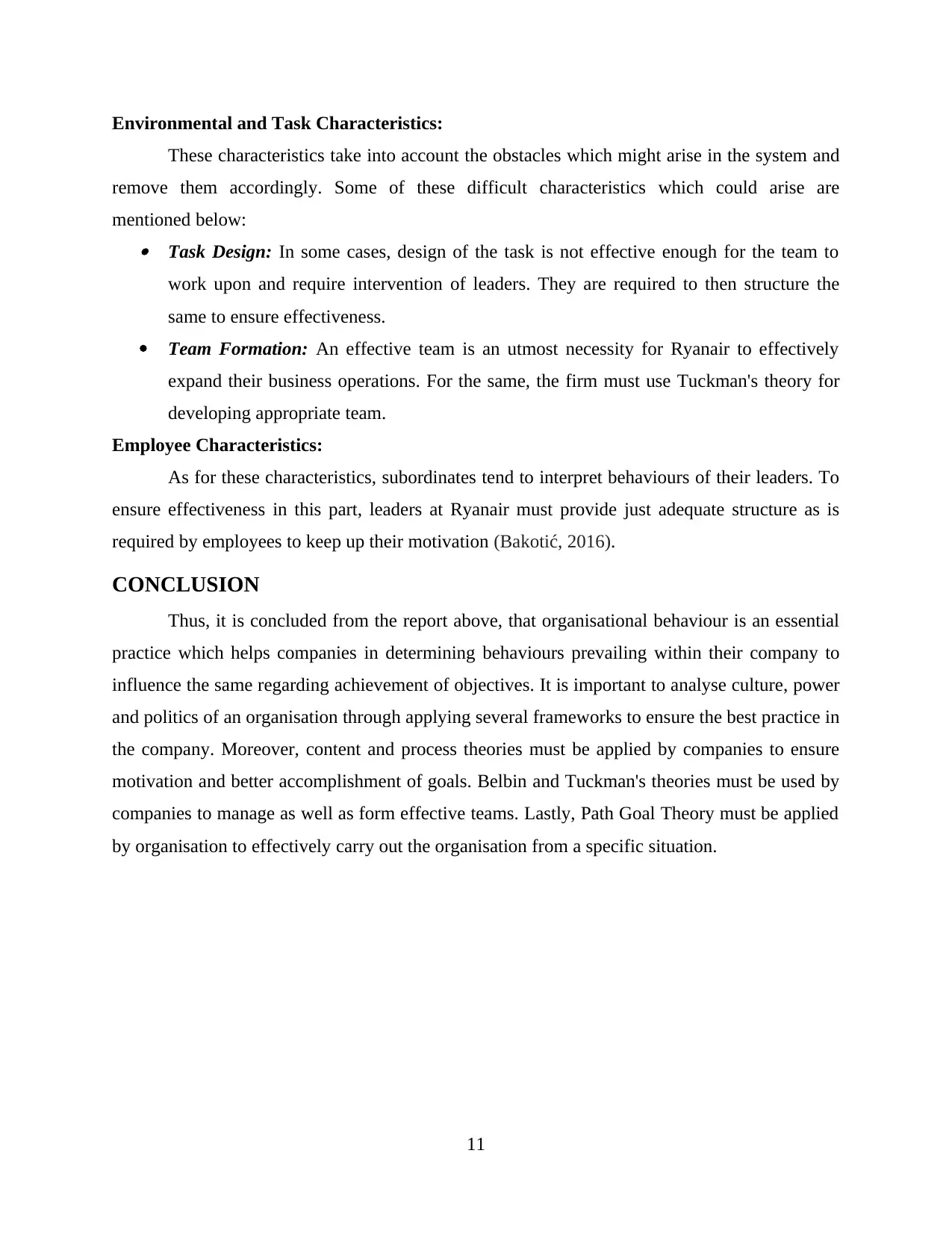
Environmental and Task Characteristics:
These characteristics take into account the obstacles which might arise in the system and
remove them accordingly. Some of these difficult characteristics which could arise are
mentioned below: Task Design: In some cases, design of the task is not effective enough for the team to
work upon and require intervention of leaders. They are required to then structure the
same to ensure effectiveness.
Team Formation: An effective team is an utmost necessity for Ryanair to effectively
expand their business operations. For the same, the firm must use Tuckman's theory for
developing appropriate team.
Employee Characteristics:
As for these characteristics, subordinates tend to interpret behaviours of their leaders. To
ensure effectiveness in this part, leaders at Ryanair must provide just adequate structure as is
required by employees to keep up their motivation (Bakotić, 2016).
CONCLUSION
Thus, it is concluded from the report above, that organisational behaviour is an essential
practice which helps companies in determining behaviours prevailing within their company to
influence the same regarding achievement of objectives. It is important to analyse culture, power
and politics of an organisation through applying several frameworks to ensure the best practice in
the company. Moreover, content and process theories must be applied by companies to ensure
motivation and better accomplishment of goals. Belbin and Tuckman's theories must be used by
companies to manage as well as form effective teams. Lastly, Path Goal Theory must be applied
by organisation to effectively carry out the organisation from a specific situation.
11
These characteristics take into account the obstacles which might arise in the system and
remove them accordingly. Some of these difficult characteristics which could arise are
mentioned below: Task Design: In some cases, design of the task is not effective enough for the team to
work upon and require intervention of leaders. They are required to then structure the
same to ensure effectiveness.
Team Formation: An effective team is an utmost necessity for Ryanair to effectively
expand their business operations. For the same, the firm must use Tuckman's theory for
developing appropriate team.
Employee Characteristics:
As for these characteristics, subordinates tend to interpret behaviours of their leaders. To
ensure effectiveness in this part, leaders at Ryanair must provide just adequate structure as is
required by employees to keep up their motivation (Bakotić, 2016).
CONCLUSION
Thus, it is concluded from the report above, that organisational behaviour is an essential
practice which helps companies in determining behaviours prevailing within their company to
influence the same regarding achievement of objectives. It is important to analyse culture, power
and politics of an organisation through applying several frameworks to ensure the best practice in
the company. Moreover, content and process theories must be applied by companies to ensure
motivation and better accomplishment of goals. Belbin and Tuckman's theories must be used by
companies to manage as well as form effective teams. Lastly, Path Goal Theory must be applied
by organisation to effectively carry out the organisation from a specific situation.
11
Paraphrase This Document
Need a fresh take? Get an instant paraphrase of this document with our AI Paraphraser
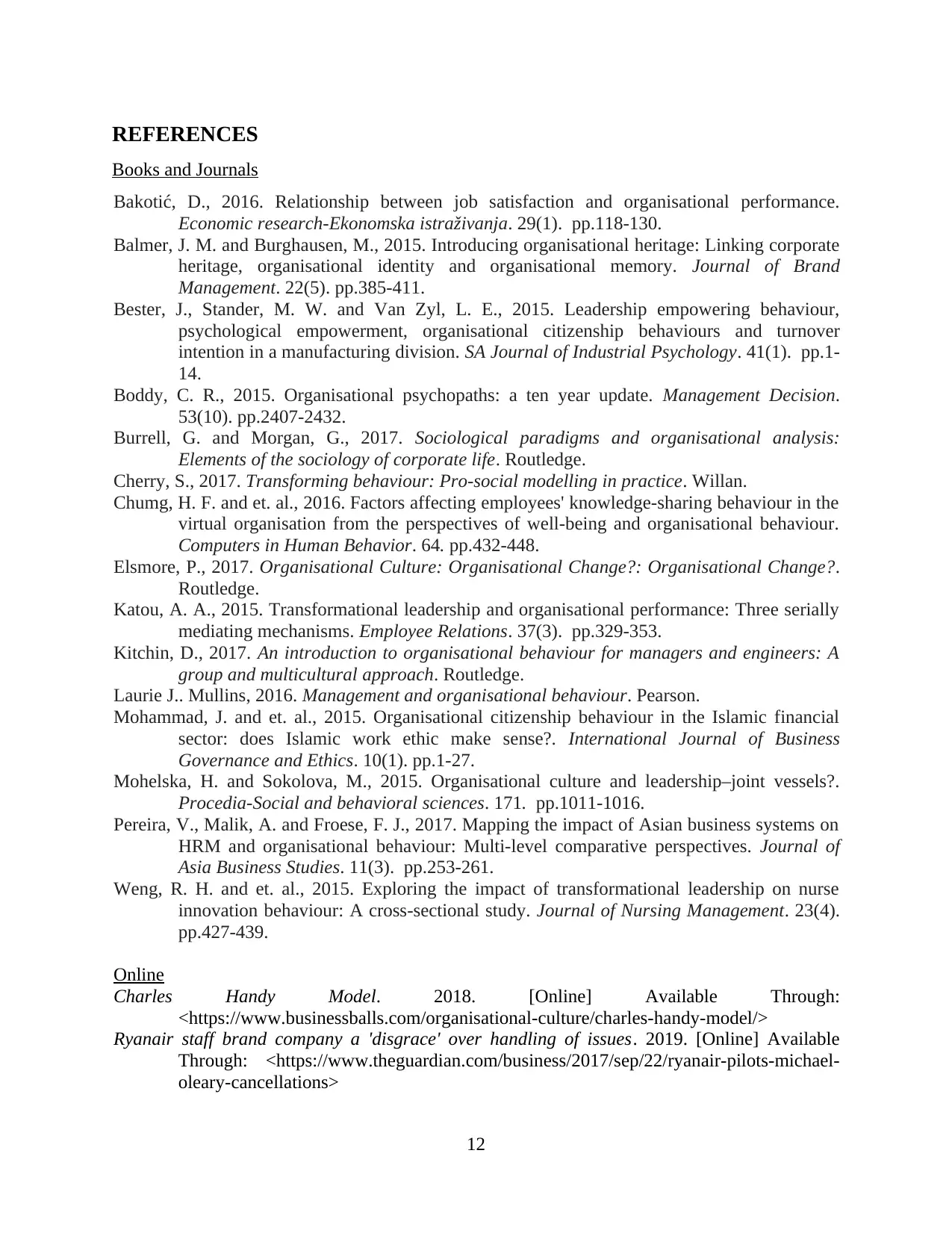
REFERENCES
Books and Journals
Bakotić, D., 2016. Relationship between job satisfaction and organisational performance.
Economic research-Ekonomska istraživanja. 29(1). pp.118-130.
Balmer, J. M. and Burghausen, M., 2015. Introducing organisational heritage: Linking corporate
heritage, organisational identity and organisational memory. Journal of Brand
Management. 22(5). pp.385-411.
Bester, J., Stander, M. W. and Van Zyl, L. E., 2015. Leadership empowering behaviour,
psychological empowerment, organisational citizenship behaviours and turnover
intention in a manufacturing division. SA Journal of Industrial Psychology. 41(1). pp.1-
14.
Boddy, C. R., 2015. Organisational psychopaths: a ten year update. Management Decision.
53(10). pp.2407-2432.
Burrell, G. and Morgan, G., 2017. Sociological paradigms and organisational analysis:
Elements of the sociology of corporate life. Routledge.
Cherry, S., 2017. Transforming behaviour: Pro-social modelling in practice. Willan.
Chumg, H. F. and et. al., 2016. Factors affecting employees' knowledge-sharing behaviour in the
virtual organisation from the perspectives of well-being and organisational behaviour.
Computers in Human Behavior. 64. pp.432-448.
Elsmore, P., 2017. Organisational Culture: Organisational Change?: Organisational Change?.
Routledge.
Katou, A. A., 2015. Transformational leadership and organisational performance: Three serially
mediating mechanisms. Employee Relations. 37(3). pp.329-353.
Kitchin, D., 2017. An introduction to organisational behaviour for managers and engineers: A
group and multicultural approach. Routledge.
Laurie J.. Mullins, 2016. Management and organisational behaviour. Pearson.
Mohammad, J. and et. al., 2015. Organisational citizenship behaviour in the Islamic financial
sector: does Islamic work ethic make sense?. International Journal of Business
Governance and Ethics. 10(1). pp.1-27.
Mohelska, H. and Sokolova, M., 2015. Organisational culture and leadership–joint vessels?.
Procedia-Social and behavioral sciences. 171. pp.1011-1016.
Pereira, V., Malik, A. and Froese, F. J., 2017. Mapping the impact of Asian business systems on
HRM and organisational behaviour: Multi-level comparative perspectives. Journal of
Asia Business Studies. 11(3). pp.253-261.
Weng, R. H. and et. al., 2015. Exploring the impact of transformational leadership on nurse
innovation behaviour: A cross‐sectional study. Journal of Nursing Management. 23(4).
pp.427-439.
Online
Charles Handy Model. 2018. [Online] Available Through:
<https://www.businessballs.com/organisational-culture/charles-handy-model/>
Ryanair staff brand company a 'disgrace' over handling of issues. 2019. [Online] Available
Through: <https://www.theguardian.com/business/2017/sep/22/ryanair-pilots-michael-
oleary-cancellations>
12
Books and Journals
Bakotić, D., 2016. Relationship between job satisfaction and organisational performance.
Economic research-Ekonomska istraživanja. 29(1). pp.118-130.
Balmer, J. M. and Burghausen, M., 2015. Introducing organisational heritage: Linking corporate
heritage, organisational identity and organisational memory. Journal of Brand
Management. 22(5). pp.385-411.
Bester, J., Stander, M. W. and Van Zyl, L. E., 2015. Leadership empowering behaviour,
psychological empowerment, organisational citizenship behaviours and turnover
intention in a manufacturing division. SA Journal of Industrial Psychology. 41(1). pp.1-
14.
Boddy, C. R., 2015. Organisational psychopaths: a ten year update. Management Decision.
53(10). pp.2407-2432.
Burrell, G. and Morgan, G., 2017. Sociological paradigms and organisational analysis:
Elements of the sociology of corporate life. Routledge.
Cherry, S., 2017. Transforming behaviour: Pro-social modelling in practice. Willan.
Chumg, H. F. and et. al., 2016. Factors affecting employees' knowledge-sharing behaviour in the
virtual organisation from the perspectives of well-being and organisational behaviour.
Computers in Human Behavior. 64. pp.432-448.
Elsmore, P., 2017. Organisational Culture: Organisational Change?: Organisational Change?.
Routledge.
Katou, A. A., 2015. Transformational leadership and organisational performance: Three serially
mediating mechanisms. Employee Relations. 37(3). pp.329-353.
Kitchin, D., 2017. An introduction to organisational behaviour for managers and engineers: A
group and multicultural approach. Routledge.
Laurie J.. Mullins, 2016. Management and organisational behaviour. Pearson.
Mohammad, J. and et. al., 2015. Organisational citizenship behaviour in the Islamic financial
sector: does Islamic work ethic make sense?. International Journal of Business
Governance and Ethics. 10(1). pp.1-27.
Mohelska, H. and Sokolova, M., 2015. Organisational culture and leadership–joint vessels?.
Procedia-Social and behavioral sciences. 171. pp.1011-1016.
Pereira, V., Malik, A. and Froese, F. J., 2017. Mapping the impact of Asian business systems on
HRM and organisational behaviour: Multi-level comparative perspectives. Journal of
Asia Business Studies. 11(3). pp.253-261.
Weng, R. H. and et. al., 2015. Exploring the impact of transformational leadership on nurse
innovation behaviour: A cross‐sectional study. Journal of Nursing Management. 23(4).
pp.427-439.
Online
Charles Handy Model. 2018. [Online] Available Through:
<https://www.businessballs.com/organisational-culture/charles-handy-model/>
Ryanair staff brand company a 'disgrace' over handling of issues. 2019. [Online] Available
Through: <https://www.theguardian.com/business/2017/sep/22/ryanair-pilots-michael-
oleary-cancellations>
12
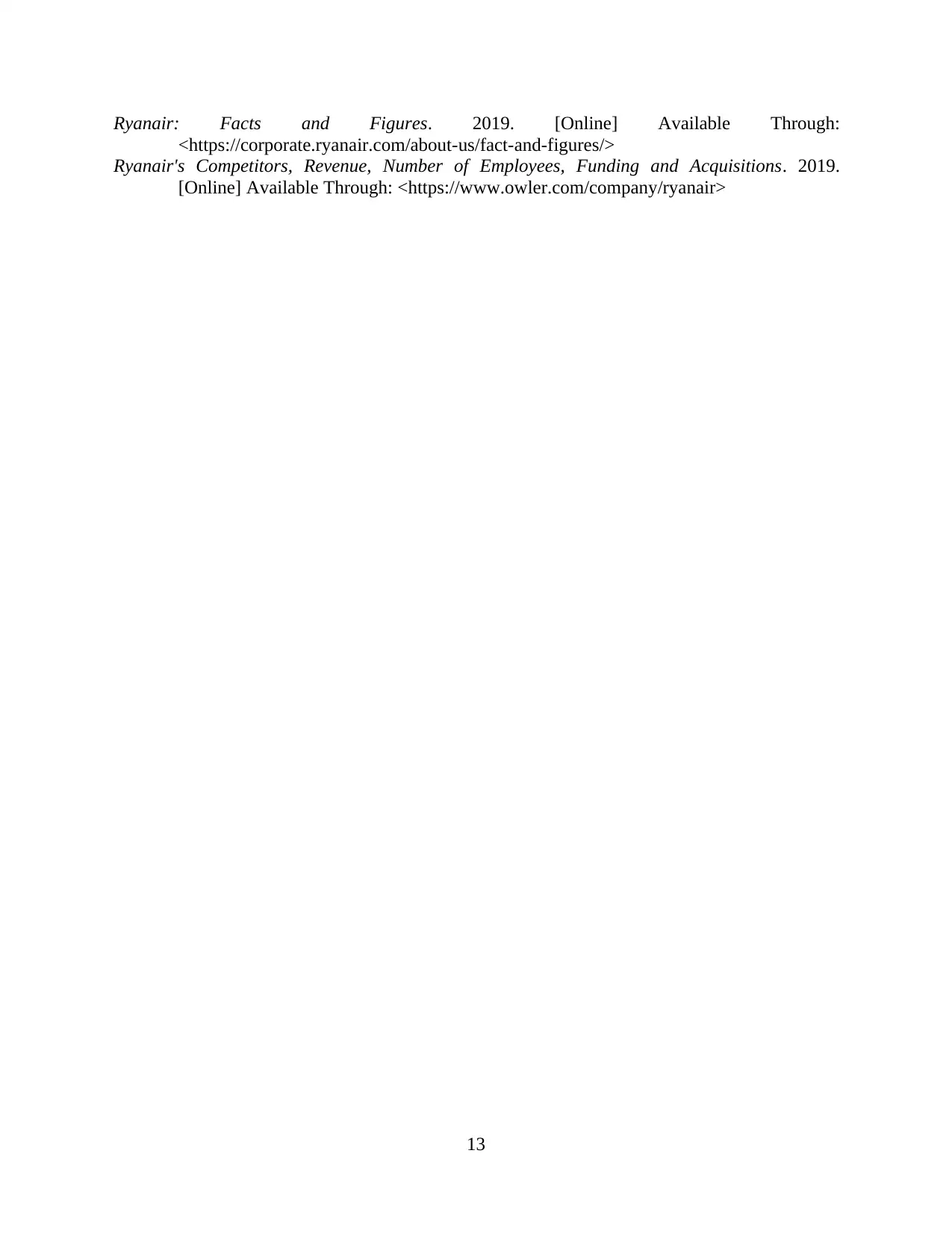
Ryanair: Facts and Figures. 2019. [Online] Available Through:
<https://corporate.ryanair.com/about-us/fact-and-figures/>
Ryanair's Competitors, Revenue, Number of Employees, Funding and Acquisitions. 2019.
[Online] Available Through: <https://www.owler.com/company/ryanair>
13
<https://corporate.ryanair.com/about-us/fact-and-figures/>
Ryanair's Competitors, Revenue, Number of Employees, Funding and Acquisitions. 2019.
[Online] Available Through: <https://www.owler.com/company/ryanair>
13
1 out of 15
Related Documents
Your All-in-One AI-Powered Toolkit for Academic Success.
+13062052269
info@desklib.com
Available 24*7 on WhatsApp / Email
![[object Object]](/_next/static/media/star-bottom.7253800d.svg)
Unlock your academic potential
© 2024 | Zucol Services PVT LTD | All rights reserved.





